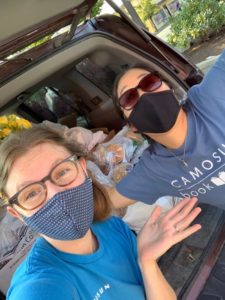Many students have extra challenges on their plate this semester, and Camosun has found a way to help those who are in need while also providing practical training to students. For a limited time, care hampers containing fresh food and essential hygiene products are being provided by Camosun, thanks to the work of Culinary Arts students (applications to get hampers are now closed).
Culinary Arts chair Steve Walker-Duncan says his students are required to have practical work-based training to complete the program. Since the cafeteria at Interurban’s Helmut Huber Culinary Arts Centre—where the students normally get experience—is closed due to COVID-19, creating the hampers provides a way to receive that experience while giving back to the community.
“It made perfect sense to pair with the hamper program,” he says. “We’re actively encouraging them and getting them to participate in the packing, coordination, and sorting of the food for the hamper, so they really are stepping up and helping their peers with this initiative.”

Walker-Duncan says that food is an important part of our culture, and that the program (funded largely through a donation from the Camosun College Student Society) allows students to contribute to their local community.
“It gives them an opportunity to be part of that community initiative and feel good about it, and we really want them to know they have quite a significant responsibility, and also a certain degree of power and authority to support people,” he says. “When we think about food as part of life and part of our society and culture, the role that they play is far bigger than just putting food on a plate in a restaurant.”
Maria Thomaz is an international student who arrived two months ago from Brazil with her family; she was one of the first recipients of the care hampers. However, Thomaz says that Camosun began caring for her even while she was still in Brazil.
“When I told Camosun that I would start [in the fall] term and I could get a flight to come, they [sent] me messages to ask me about the flight, and they are very supportive,” she says. “It was so nice of them; they were in touch all the time to see everything was okay.”
Thomaz says it was a stressful time because her original immigration plans were disrupted due to COVID-19, which left her family in uncertainty. When her Camosun representative heard of the complications, she recommended Thomaz to the hamper program.
“It was very helpful for us, especially because we are a family, and it’s also a way to say that we matter,” she says. “It’s a huge change in our life, so for me it’s like an institution saying to us, ‘Don’t worry, we can help you if you need, we are here, you are not alone.’”
Recipes designed to utilize the provided ingredients are also included in the hampers.
“We have quite a unique opportunity for people to actually take stock and recognize that they can cook,” says Walker-Duncan. “You can put some food together, make some simple dishes, use fresh produce and ingredients that will put something tasty on the plate.”
For Thomaz, this was a success, as she and her family were introduced to new interesting foods.
“There was different vegetables that we never tried before, like squash, and there is other ones that even Google Lens couldn’t find for me,” she says with a laugh.
Thomaz says that her children really enjoyed the food, and that the hamper even helped her family integrate further into Canadian culture.
“We wrote the names of the food in English and put them on the fridge so they can learn new words,” she says. “My daughter also had an idea to draw something to deliver to the volunteer that came here, as a way to say thanks. It was cute.”
